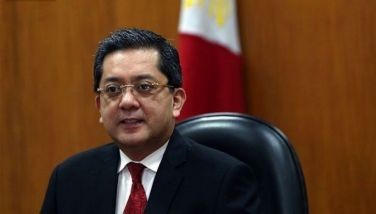Sereno: Constitution rejects Marcos-style martial law

Chief Justice Maria Lourdes Sereno speaks to students at the commencement exercise at Ateneo de Manila University in Quezon City on Friday, May 26, 2017. SC PIO/Released
MANILA, Philippines — The 1987 Constitution, crafted following a people's uprising that deposed dictator Ferdinand Marcos, places limits on the president's power and upholds democratic checks and balances, the chief justice said.
In her graduation address on Friday at the Ateneo de Manila University, Supreme Court chief magistrate Maria Lourdes Sereno said "the 1987 Constitution in clear and unmistakable language rejects and absolutely prohibits the particular kind of martial law that began in our country in September of 1972.
She recounted the dark period of Martial Law under Marcos, who prolonged the power for dictatorship.
"That period was characterized by widespread human rights violations in the forms of murders, rape, and other forms of torture, forced disappearnces, arbitrary arrests and illegal detention and forced isolation or hamleting of villages," Sereno said. Her address was titled "The Atenean Facing Martial Law."
The remark was after President Rodrigo Duterte himself said the martial law he recently declared would be no different to that of Marcos.
Fears stoked by the term martial law, and suspension of the writ of habeas corpus are not surprising, as it came from the martial law imposed by the late strongman, she said.
"If President Duterte and the aforementioned government authorities avoid the gross historical scenes of Mr. Marcos and his agents, then our country might reap the benefits of the legitimate use of the provisions on martial law in the 1987 Constitution," Sereno said.
Use martial law for 'defined emergencies'
Sereno also said that while martial law can be used to solve "defined emergencies" it may also result in oppression.
"All earthly powers, when abused, can result in oppression," Sereno said in her speech during the graduation rights at the Ateneo de Manila University.
She added that if properly implemented, martial law "should not, by itself, unduly burden our country."
The head magistrate chose martial law as a topic for her address on Friday, three days after President Rodrigo Duterte placed Mindanao under the state of military rule.
Duterte said the decision was made when the extremist Maute group marched into Marawi City in the south and exchanged gunfire with military.
Sereno, meanwhile, that "our hopes for the future" will depend on whether the executive department led by the president, the entire Armed Forces of the Philippines and the Philippine National Police, the Department of Justice and its officials and prosecutors, the chief public attorney and her public defenders will abide by the constitution and by the institutional laws while martial law is in effect.
"It also depends on whether Congress and the Supreme Court will exercise their review powers appropriately over the declaration of martial law and the suspension of the privilege of writ of habeas corpus," Sereno added.
Congress may choose to revoke the declaration, but with both houses full of Duterte allies, martial law is expected to be upheld.
The Supreme Court, meanwhile, can review the measure when a petitioner challenges it.
- Latest
- Trending



























